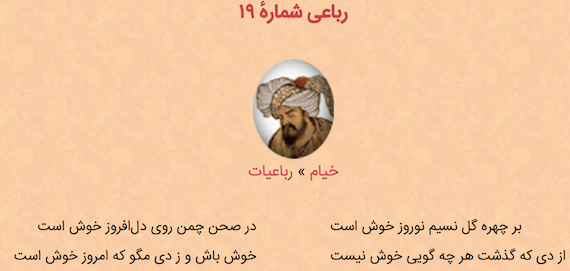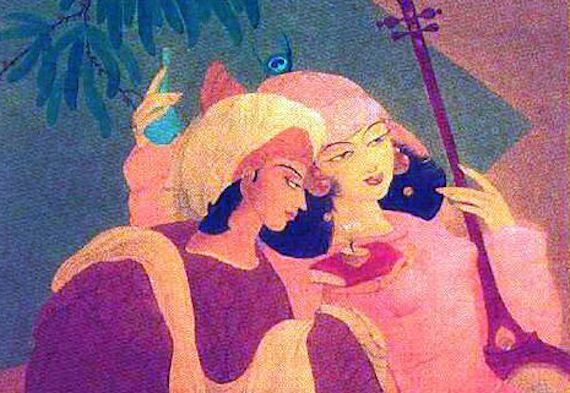Ann Arbor (Informed Comment) –
I am rewriting a previous essay here, quoting some extra poems different from the ones I used last year, but my big points remain the same. After the dark year of 2021, I thought it might be nice to talk about poetry and rebirth today. The quatrains or Rubaiyat attributed to the medieval astronomer Omar Khayyam (d. 1131), four-line Persian poems, are often about renewal, and some make special mention of New Year’s Day (Now-Ruz in Persian).
Here’s the thing: in ancient, Zoroastrian, Iran, New Year’s Day was celebrated on the vernal equinox (21 or 20 March). So although in all cultures, New Year’s is a time of renewal and rebirth, in Iran it coincides with the beginning of spring and not just, as in Christian culture, the beginning of the end of winter.
In April of 2020, I brought out a new translation of the Rubaiyat, which has been called “aggressively modern.” The poetry had been made famous by the rendering of the Victorian translator, Edward FitzGerald. Alas, the pandemic deprived me of any opportunity for readings in bookstores. So this blog is the next best thing.
In the first poem, below, I substituted “spring” for Now Ruz, since the spring references with regard to the New Year would have been confusing for Anglophone audiences. But it is in the original a “New Year’s breeze.”
The spring breeze on a rose’s cheek spreads joy.
The face you glimpse beyond the blooms grants bliss.
No words about last winter can bring cheer;
don’t speak of yesterday —- rejoice today.

h/t ganjoor.net.
People have always partied on the New Year, and medieval Iran was no exception. This poetry is the opposite of the puritanical ideology we often hear from the Middle East, but anyone who has actually lived there knows that the stereotype of sober religiousness is just that. This poetry urges people to have a good time while they still can:
Deep in my dream, I heard a sage cry out:
“What joy has slumber ever caused to bloom?
Why do a thing that looks so much like death?
Go drinking! Lifetimes soon will pass in sleep!”
The passing of the old year is an occasion for teary nostalgia, and the prospect of a new year is an occasion for trepidation. The Rubaiyat’s message to us at moments like this is, “Chill!”
Like cascading waters, or a desert squall,
another day of my life has fled.
But I never feel regret for two days:
The one that hasn’t yet arrived and the one that long since passed.
Another poem with overtones of New Year is this:
Now that the world verges on being happy,
the high-spirited plan to make merry outside.
Each branch is putting out shoots as white as the
hand of Moses,
and every breeze wafts the life-giving breath of Jesus.
Trees with white blooms like our magnolias or elderberries are being compared here to the miraculous white hand of Moses. Turning his hand white was one of his divine signs that God instructed the Hebrew prophet to use when he confronted Pharaoh:
Exodus 4:1,6-7
- Then Moses answered, “But suppose they do not believe me or listen to me, but say, ‘The Lord did not appear to you.’… Again, the Lord said to him, “Put your hand inside your cloak.” He put his hand into his cloak; and when he took it out, his hand was leprous,[a] as white as snow. Then God said, “Put your hand back into your cloak”—so he put his hand back into his cloak, and when he took it out, it was restored like the rest of his body—
This miracle is also mentioned in the Qur’an, and Persian poetry refers to it as a sign of renewal, since Moses can reverse the condition at will.
The other reference is to Jesus’ ability to raise the dead.
We were reminded last year of how fleeting life is, how unpredictable fate. The poetry, however, urges against dwelling on our own ephemerality. Awareness of it should instead impell us to become joyous and make every moment count.
Since we can’t trust tomorrow,
find a way to fill this lovelorn heart with joy:
Drink up in the light of the moon– a moon that someday
will look for us …and not find us.
The moon won’t find so many of us after the grim last year, but those of us it can still descry must find a way to fill our lovelorn hearts with joy in the new year.
Order from
or Schuler Books in Ann Arbor, who will ship it to you
or Literati Bookstore in Ann Arbor, who will ship it to you
or Barnes and Noble, who will ship or do curbside delivery.
or Amazon
Reviews:
“’To read Juan Cole’s deft, plain-spoken translation of the Rubáiyát
is to find companionship, to rejoin a thousand-year human
conversation about how to endure, enjoy, and find a fleeting beauty
in everlastingly dire times. The lucid, cogent and mind-opening
Epilogue is a kind of grace, a gift freely given, from one of our
most astonishing and generous intellects.’”
– Michael Chabon, Pulitzer Prize winner and author of Moonglow (2017)
“’Omar Khayyam is a Persian treasure and Juan Cole’s new
translation brings him anew to Western audiences who
for centuries have been both delighted and educated by this
medieval sage! Reading The Rubáiyát is a thrill – you feel the
echoes of the 12th century seamlessly into our 21st, as this is
a holy book of wisdom and magic. In another perilous era for
Iranians, it’s wonderful to see this enchanting volume make
its way through the world yet again!’”
– Porochista Khakpour, novelist, essayist and author of Brown Album (2020)
Featured Illustration: screenshot from a work of Abdur Rahman Chughtai.


 © 2026 All Rights Reserved
© 2026 All Rights Reserved